Leadership Case Study: HR Policy Issues in International Expansion
VerifiedAdded on 2023/06/13
|10
|2814
|284
Case Study
AI Summary
This case study report examines the HR challenges faced by an Australian technology organization as it expands internationally, specifically focusing on its subsidiaries in New Zealand and Indonesia. The core issue revolves around the ineffective implementation of standardized HR policies, particularly performance-based rewards, in the Indonesian subsidiary due to cultural differences. Using Hofstede's cultural dimensions, the report analyzes the impact of Indonesia's collectivist culture, high power distance, and preference for stability on team performance. Recommendations are provided to address these issues, emphasizing the need for cultural adaptation, localized HR strategies, and a deeper understanding of Indonesian values to foster a more cohesive and productive work environment. The report concludes that a thorough understanding of national culture and organizational beliefs is crucial for successful international management, highlighting the importance of adapting leadership styles to suit the specific cultural context.
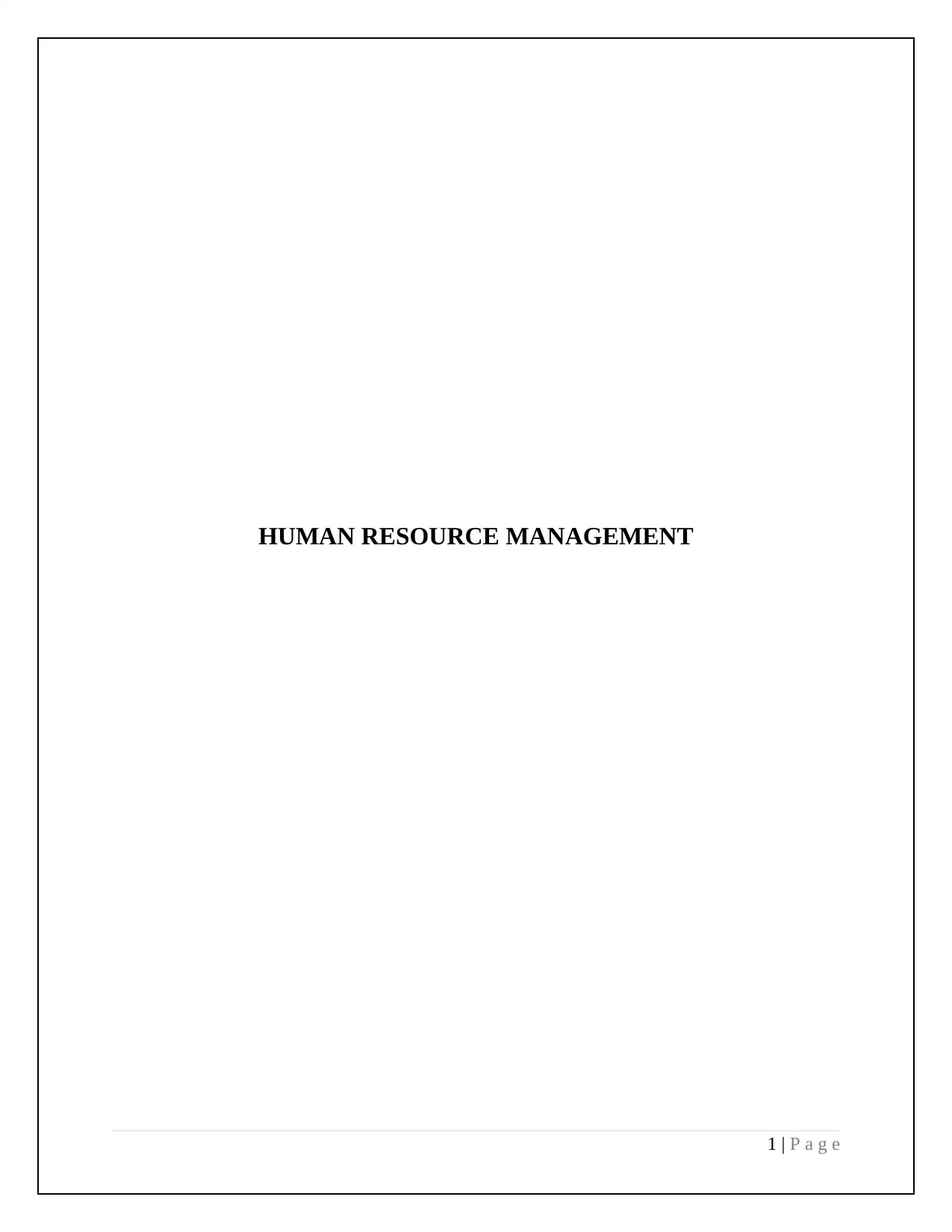
HUMAN RESOURCE MANAGEMENT
1 | P a g e
1 | P a g e
Paraphrase This Document
Need a fresh take? Get an instant paraphrase of this document with our AI Paraphraser
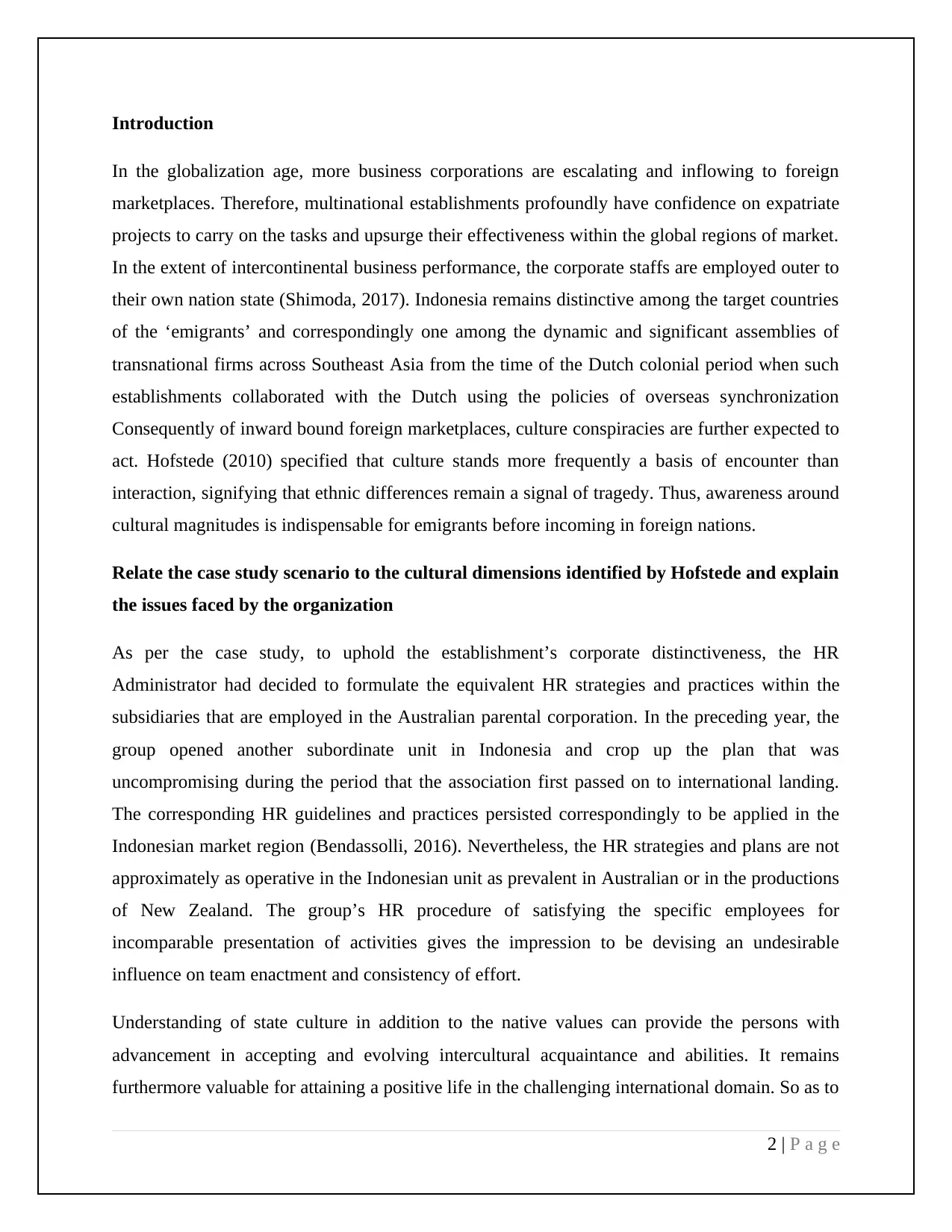
Introduction
In the globalization age, more business corporations are escalating and inflowing to foreign
marketplaces. Therefore, multinational establishments profoundly have confidence on expatriate
projects to carry on the tasks and upsurge their effectiveness within the global regions of market.
In the extent of intercontinental business performance, the corporate staffs are employed outer to
their own nation state (Shimoda, 2017). Indonesia remains distinctive among the target countries
of the ‘emigrants’ and correspondingly one among the dynamic and significant assemblies of
transnational firms across Southeast Asia from the time of the Dutch colonial period when such
establishments collaborated with the Dutch using the policies of overseas synchronization
Consequently of inward bound foreign marketplaces, culture conspiracies are further expected to
act. Hofstede (2010) specified that culture stands more frequently a basis of encounter than
interaction, signifying that ethnic differences remain a signal of tragedy. Thus, awareness around
cultural magnitudes is indispensable for emigrants before incoming in foreign nations.
Relate the case study scenario to the cultural dimensions identified by Hofstede and explain
the issues faced by the organization
As per the case study, to uphold the establishment’s corporate distinctiveness, the HR
Administrator had decided to formulate the equivalent HR strategies and practices within the
subsidiaries that are employed in the Australian parental corporation. In the preceding year, the
group opened another subordinate unit in Indonesia and crop up the plan that was
uncompromising during the period that the association first passed on to international landing.
The corresponding HR guidelines and practices persisted correspondingly to be applied in the
Indonesian market region (Bendassolli, 2016). Nevertheless, the HR strategies and plans are not
approximately as operative in the Indonesian unit as prevalent in Australian or in the productions
of New Zealand. The group’s HR procedure of satisfying the specific employees for
incomparable presentation of activities gives the impression to be devising an undesirable
influence on team enactment and consistency of effort.
Understanding of state culture in addition to the native values can provide the persons with
advancement in accepting and evolving intercultural acquaintance and abilities. It remains
furthermore valuable for attaining a positive life in the challenging international domain. So as to
2 | P a g e
In the globalization age, more business corporations are escalating and inflowing to foreign
marketplaces. Therefore, multinational establishments profoundly have confidence on expatriate
projects to carry on the tasks and upsurge their effectiveness within the global regions of market.
In the extent of intercontinental business performance, the corporate staffs are employed outer to
their own nation state (Shimoda, 2017). Indonesia remains distinctive among the target countries
of the ‘emigrants’ and correspondingly one among the dynamic and significant assemblies of
transnational firms across Southeast Asia from the time of the Dutch colonial period when such
establishments collaborated with the Dutch using the policies of overseas synchronization
Consequently of inward bound foreign marketplaces, culture conspiracies are further expected to
act. Hofstede (2010) specified that culture stands more frequently a basis of encounter than
interaction, signifying that ethnic differences remain a signal of tragedy. Thus, awareness around
cultural magnitudes is indispensable for emigrants before incoming in foreign nations.
Relate the case study scenario to the cultural dimensions identified by Hofstede and explain
the issues faced by the organization
As per the case study, to uphold the establishment’s corporate distinctiveness, the HR
Administrator had decided to formulate the equivalent HR strategies and practices within the
subsidiaries that are employed in the Australian parental corporation. In the preceding year, the
group opened another subordinate unit in Indonesia and crop up the plan that was
uncompromising during the period that the association first passed on to international landing.
The corresponding HR guidelines and practices persisted correspondingly to be applied in the
Indonesian market region (Bendassolli, 2016). Nevertheless, the HR strategies and plans are not
approximately as operative in the Indonesian unit as prevalent in Australian or in the productions
of New Zealand. The group’s HR procedure of satisfying the specific employees for
incomparable presentation of activities gives the impression to be devising an undesirable
influence on team enactment and consistency of effort.
Understanding of state culture in addition to the native values can provide the persons with
advancement in accepting and evolving intercultural acquaintance and abilities. It remains
furthermore valuable for attaining a positive life in the challenging international domain. So as to
2 | P a g e
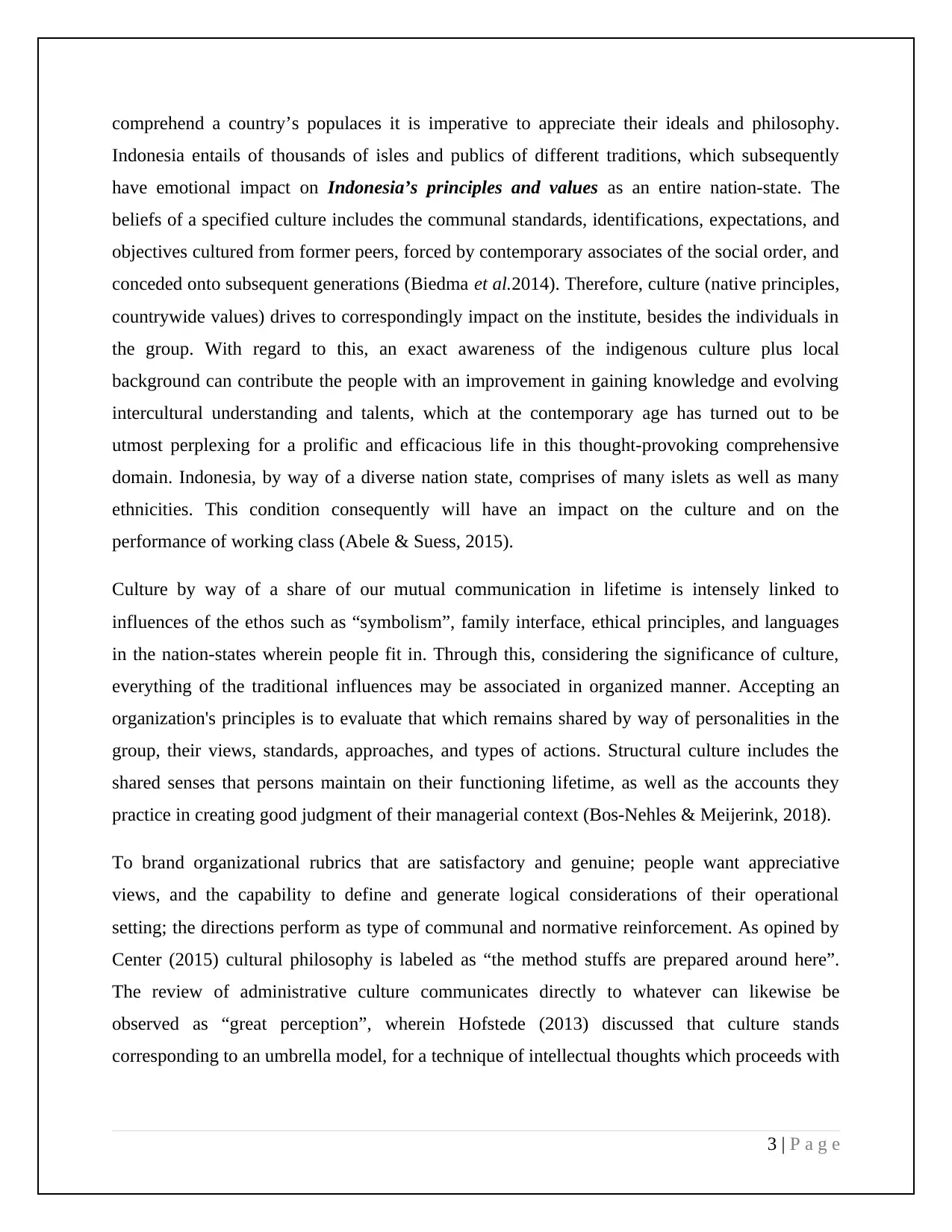
comprehend a country’s populaces it is imperative to appreciate their ideals and philosophy.
Indonesia entails of thousands of isles and publics of different traditions, which subsequently
have emotional impact on Indonesia’s principles and values as an entire nation-state. The
beliefs of a specified culture includes the communal standards, identifications, expectations, and
objectives cultured from former peers, forced by contemporary associates of the social order, and
conceded onto subsequent generations (Biedma et al.2014). Therefore, culture (native principles,
countrywide values) drives to correspondingly impact on the institute, besides the individuals in
the group. With regard to this, an exact awareness of the indigenous culture plus local
background can contribute the people with an improvement in gaining knowledge and evolving
intercultural understanding and talents, which at the contemporary age has turned out to be
utmost perplexing for a prolific and efficacious life in this thought-provoking comprehensive
domain. Indonesia, by way of a diverse nation state, comprises of many islets as well as many
ethnicities. This condition consequently will have an impact on the culture and on the
performance of working class (Abele & Suess, 2015).
Culture by way of a share of our mutual communication in lifetime is intensely linked to
influences of the ethos such as “symbolism”, family interface, ethical principles, and languages
in the nation-states wherein people fit in. Through this, considering the significance of culture,
everything of the traditional influences may be associated in organized manner. Accepting an
organization's principles is to evaluate that which remains shared by way of personalities in the
group, their views, standards, approaches, and types of actions. Structural culture includes the
shared senses that persons maintain on their functioning lifetime, as well as the accounts they
practice in creating good judgment of their managerial context (Bos-Nehles & Meijerink, 2018).
To brand organizational rubrics that are satisfactory and genuine; people want appreciative
views, and the capability to define and generate logical considerations of their operational
setting; the directions perform as type of communal and normative reinforcement. As opined by
Center (2015) cultural philosophy is labeled as “the method stuffs are prepared around here”.
The review of administrative culture communicates directly to whatever can likewise be
observed as “great perception”, wherein Hofstede (2013) discussed that culture stands
corresponding to an umbrella model, for a technique of intellectual thoughts which proceeds with
3 | P a g e
Indonesia entails of thousands of isles and publics of different traditions, which subsequently
have emotional impact on Indonesia’s principles and values as an entire nation-state. The
beliefs of a specified culture includes the communal standards, identifications, expectations, and
objectives cultured from former peers, forced by contemporary associates of the social order, and
conceded onto subsequent generations (Biedma et al.2014). Therefore, culture (native principles,
countrywide values) drives to correspondingly impact on the institute, besides the individuals in
the group. With regard to this, an exact awareness of the indigenous culture plus local
background can contribute the people with an improvement in gaining knowledge and evolving
intercultural understanding and talents, which at the contemporary age has turned out to be
utmost perplexing for a prolific and efficacious life in this thought-provoking comprehensive
domain. Indonesia, by way of a diverse nation state, comprises of many islets as well as many
ethnicities. This condition consequently will have an impact on the culture and on the
performance of working class (Abele & Suess, 2015).
Culture by way of a share of our mutual communication in lifetime is intensely linked to
influences of the ethos such as “symbolism”, family interface, ethical principles, and languages
in the nation-states wherein people fit in. Through this, considering the significance of culture,
everything of the traditional influences may be associated in organized manner. Accepting an
organization's principles is to evaluate that which remains shared by way of personalities in the
group, their views, standards, approaches, and types of actions. Structural culture includes the
shared senses that persons maintain on their functioning lifetime, as well as the accounts they
practice in creating good judgment of their managerial context (Bos-Nehles & Meijerink, 2018).
To brand organizational rubrics that are satisfactory and genuine; people want appreciative
views, and the capability to define and generate logical considerations of their operational
setting; the directions perform as type of communal and normative reinforcement. As opined by
Center (2015) cultural philosophy is labeled as “the method stuffs are prepared around here”.
The review of administrative culture communicates directly to whatever can likewise be
observed as “great perception”, wherein Hofstede (2013) discussed that culture stands
corresponding to an umbrella model, for a technique of intellectual thoughts which proceeds with
3 | P a g e
⊘ This is a preview!⊘
Do you want full access?
Subscribe today to unlock all pages.

Trusted by 1+ million students worldwide
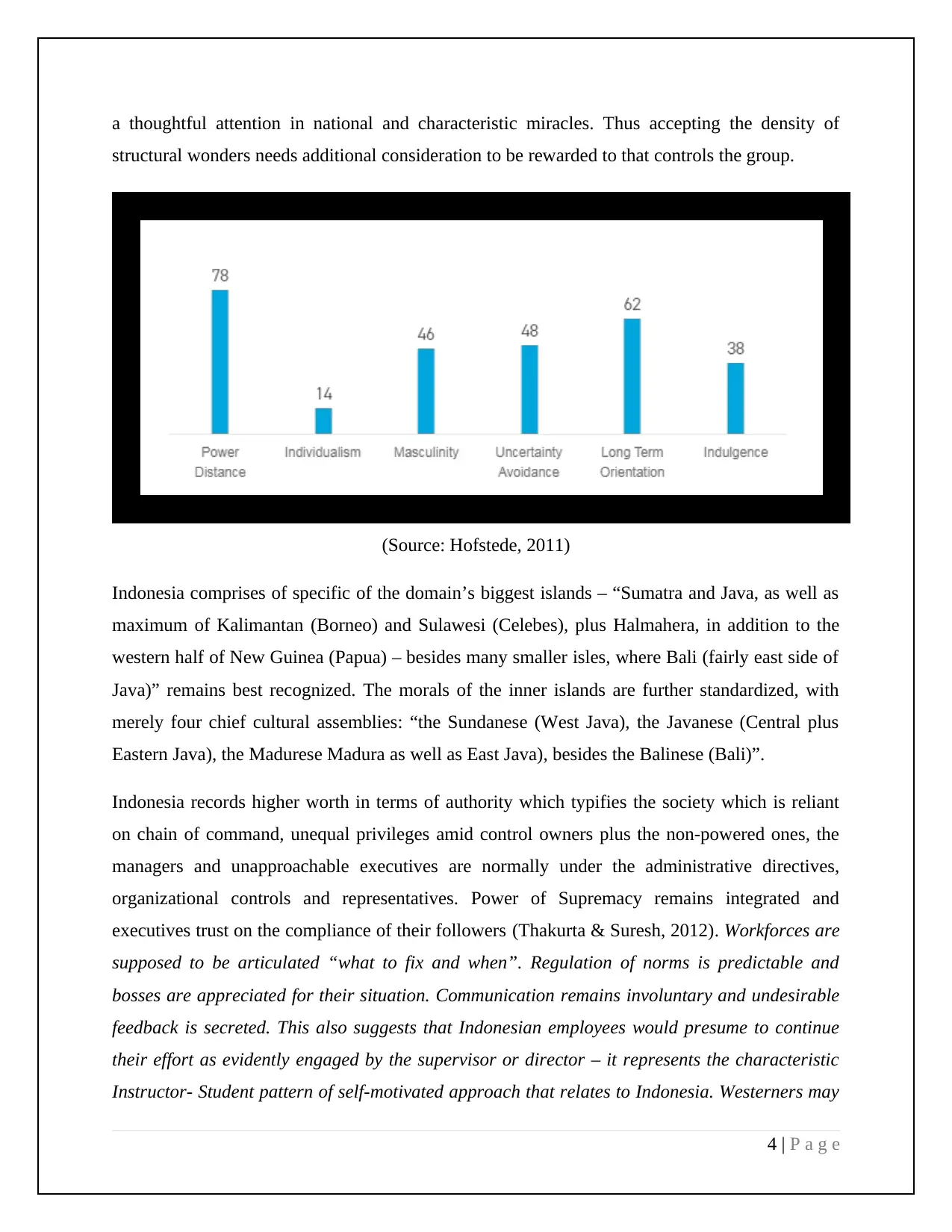
a thoughtful attention in national and characteristic miracles. Thus accepting the density of
structural wonders needs additional consideration to be rewarded to that controls the group.
(Source: Hofstede, 2011)
Indonesia comprises of specific of the domain’s biggest islands – “Sumatra and Java, as well as
maximum of Kalimantan (Borneo) and Sulawesi (Celebes), plus Halmahera, in addition to the
western half of New Guinea (Papua) – besides many smaller isles, where Bali (fairly east side of
Java)” remains best recognized. The morals of the inner islands are further standardized, with
merely four chief cultural assemblies: “the Sundanese (West Java), the Javanese (Central plus
Eastern Java), the Madurese Madura as well as East Java), besides the Balinese (Bali)”.
Indonesia records higher worth in terms of authority which typifies the society which is reliant
on chain of command, unequal privileges amid control owners plus the non-powered ones, the
managers and unapproachable executives are normally under the administrative directives,
organizational controls and representatives. Power of Supremacy remains integrated and
executives trust on the compliance of their followers (Thakurta & Suresh, 2012). Workforces are
supposed to be articulated “what to fix and when”. Regulation of norms is predictable and
bosses are appreciated for their situation. Communication remains involuntary and undesirable
feedback is secreted. This also suggests that Indonesian employees would presume to continue
their effort as evidently engaged by the supervisor or director – it represents the characteristic
Instructor- Student pattern of self-motivated approach that relates to Indonesia. Westerners may
4 | P a g e
structural wonders needs additional consideration to be rewarded to that controls the group.
(Source: Hofstede, 2011)
Indonesia comprises of specific of the domain’s biggest islands – “Sumatra and Java, as well as
maximum of Kalimantan (Borneo) and Sulawesi (Celebes), plus Halmahera, in addition to the
western half of New Guinea (Papua) – besides many smaller isles, where Bali (fairly east side of
Java)” remains best recognized. The morals of the inner islands are further standardized, with
merely four chief cultural assemblies: “the Sundanese (West Java), the Javanese (Central plus
Eastern Java), the Madurese Madura as well as East Java), besides the Balinese (Bali)”.
Indonesia records higher worth in terms of authority which typifies the society which is reliant
on chain of command, unequal privileges amid control owners plus the non-powered ones, the
managers and unapproachable executives are normally under the administrative directives,
organizational controls and representatives. Power of Supremacy remains integrated and
executives trust on the compliance of their followers (Thakurta & Suresh, 2012). Workforces are
supposed to be articulated “what to fix and when”. Regulation of norms is predictable and
bosses are appreciated for their situation. Communication remains involuntary and undesirable
feedback is secreted. This also suggests that Indonesian employees would presume to continue
their effort as evidently engaged by the supervisor or director – it represents the characteristic
Instructor- Student pattern of self-motivated approach that relates to Indonesia. Westerners may
4 | P a g e
Paraphrase This Document
Need a fresh take? Get an instant paraphrase of this document with our AI Paraphraser
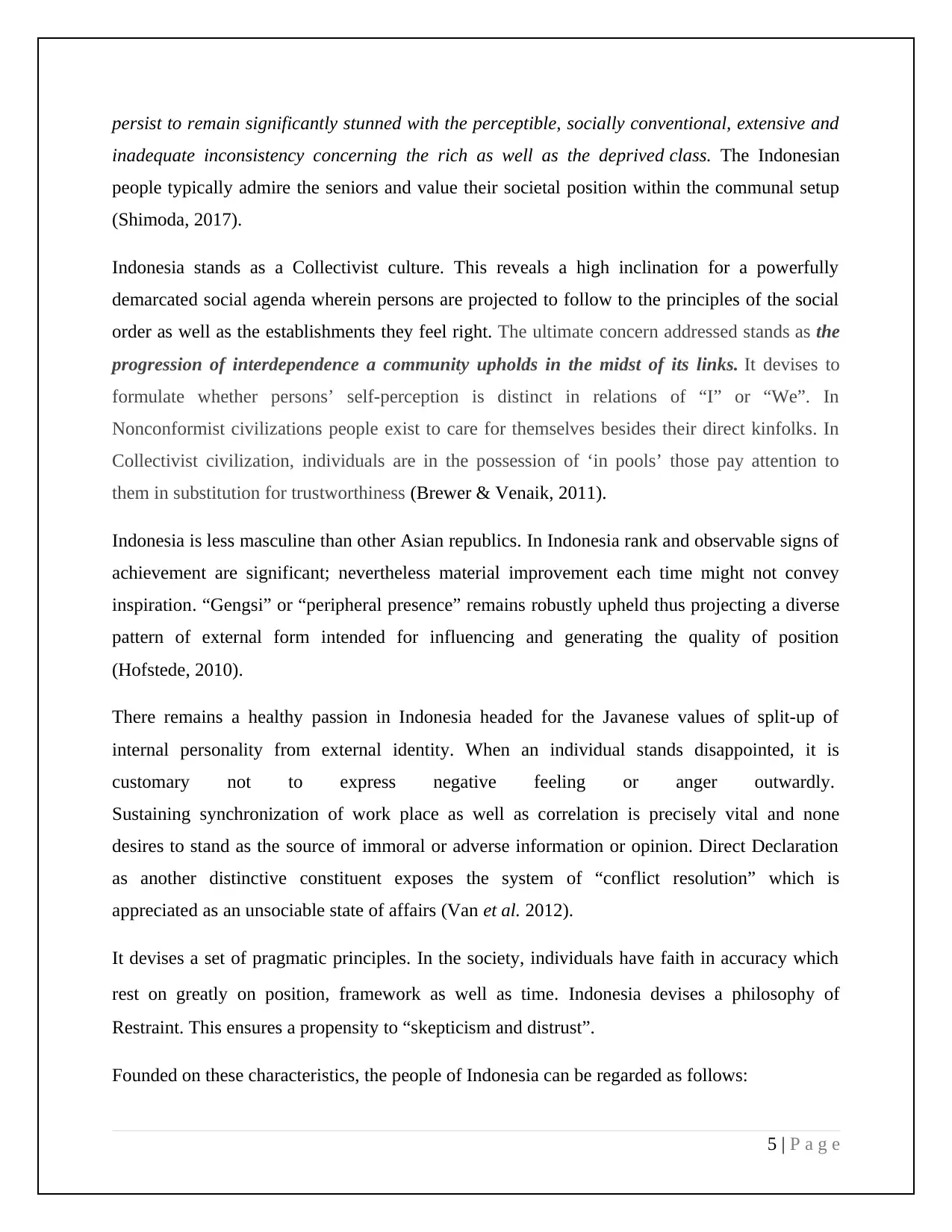
persist to remain significantly stunned with the perceptible, socially conventional, extensive and
inadequate inconsistency concerning the rich as well as the deprived class. The Indonesian
people typically admire the seniors and value their societal position within the communal setup
(Shimoda, 2017).
Indonesia stands as a Collectivist culture. This reveals a high inclination for a powerfully
demarcated social agenda wherein persons are projected to follow to the principles of the social
order as well as the establishments they feel right. The ultimate concern addressed stands as the
progression of interdependence a community upholds in the midst of its links. It devises to
formulate whether persons’ self-perception is distinct in relations of “I” or “We”. In
Nonconformist civilizations people exist to care for themselves besides their direct kinfolks. In
Collectivist civilization, individuals are in the possession of ‘in pools’ those pay attention to
them in substitution for trustworthiness (Brewer & Venaik, 2011).
Indonesia is less masculine than other Asian republics. In Indonesia rank and observable signs of
achievement are significant; nevertheless material improvement each time might not convey
inspiration. “Gengsi” or “peripheral presence” remains robustly upheld thus projecting a diverse
pattern of external form intended for influencing and generating the quality of position
(Hofstede, 2010).
There remains a healthy passion in Indonesia headed for the Javanese values of split-up of
internal personality from external identity. When an individual stands disappointed, it is
customary not to express negative feeling or anger outwardly.
Sustaining synchronization of work place as well as correlation is precisely vital and none
desires to stand as the source of immoral or adverse information or opinion. Direct Declaration
as another distinctive constituent exposes the system of “conflict resolution” which is
appreciated as an unsociable state of affairs (Van et al. 2012).
It devises a set of pragmatic principles. In the society, individuals have faith in accuracy which
rest on greatly on position, framework as well as time. Indonesia devises a philosophy of
Restraint. This ensures a propensity to “skepticism and distrust”.
Founded on these characteristics, the people of Indonesia can be regarded as follows:
5 | P a g e
inadequate inconsistency concerning the rich as well as the deprived class. The Indonesian
people typically admire the seniors and value their societal position within the communal setup
(Shimoda, 2017).
Indonesia stands as a Collectivist culture. This reveals a high inclination for a powerfully
demarcated social agenda wherein persons are projected to follow to the principles of the social
order as well as the establishments they feel right. The ultimate concern addressed stands as the
progression of interdependence a community upholds in the midst of its links. It devises to
formulate whether persons’ self-perception is distinct in relations of “I” or “We”. In
Nonconformist civilizations people exist to care for themselves besides their direct kinfolks. In
Collectivist civilization, individuals are in the possession of ‘in pools’ those pay attention to
them in substitution for trustworthiness (Brewer & Venaik, 2011).
Indonesia is less masculine than other Asian republics. In Indonesia rank and observable signs of
achievement are significant; nevertheless material improvement each time might not convey
inspiration. “Gengsi” or “peripheral presence” remains robustly upheld thus projecting a diverse
pattern of external form intended for influencing and generating the quality of position
(Hofstede, 2010).
There remains a healthy passion in Indonesia headed for the Javanese values of split-up of
internal personality from external identity. When an individual stands disappointed, it is
customary not to express negative feeling or anger outwardly.
Sustaining synchronization of work place as well as correlation is precisely vital and none
desires to stand as the source of immoral or adverse information or opinion. Direct Declaration
as another distinctive constituent exposes the system of “conflict resolution” which is
appreciated as an unsociable state of affairs (Van et al. 2012).
It devises a set of pragmatic principles. In the society, individuals have faith in accuracy which
rest on greatly on position, framework as well as time. Indonesia devises a philosophy of
Restraint. This ensures a propensity to “skepticism and distrust”.
Founded on these characteristics, the people of Indonesia can be regarded as follows:
5 | P a g e
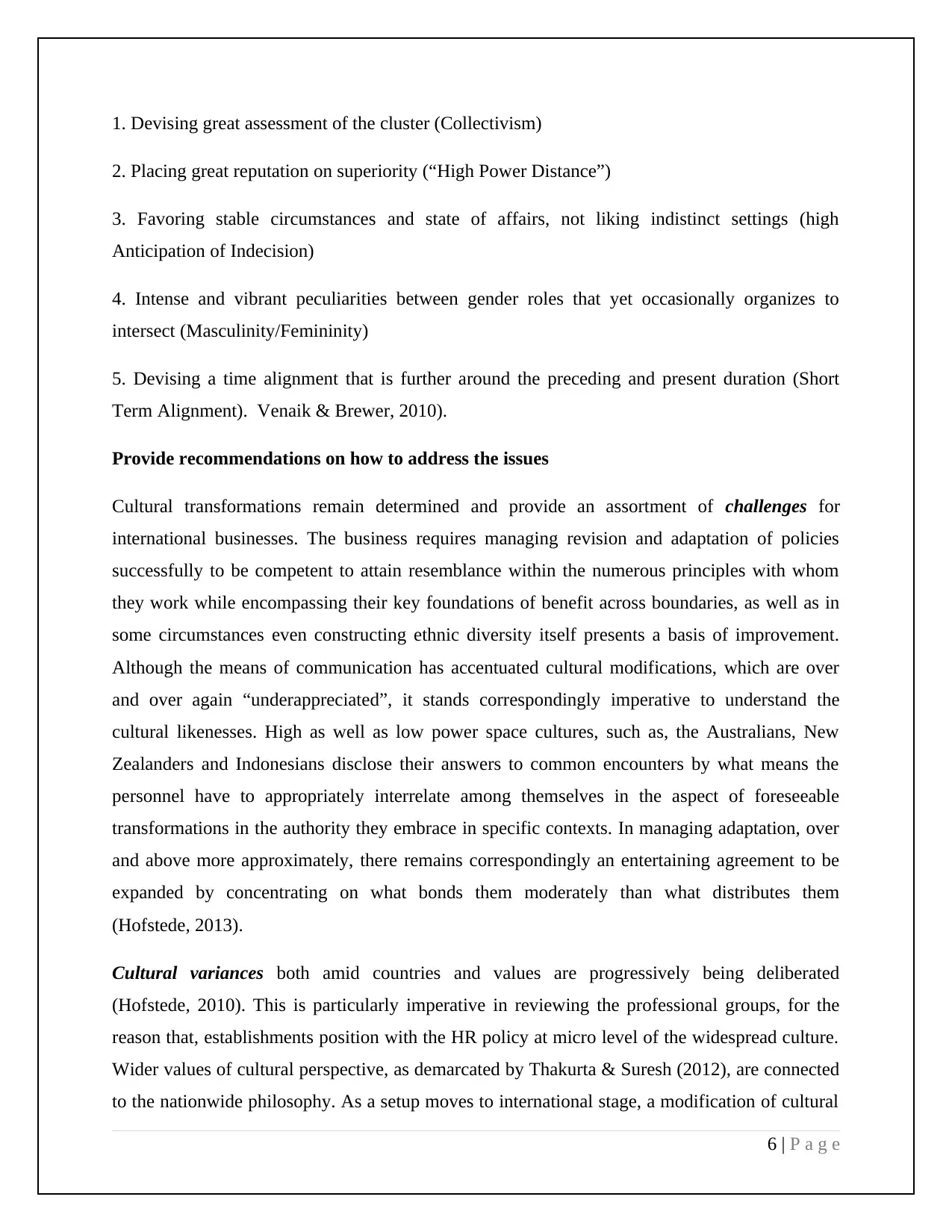
1. Devising great assessment of the cluster (Collectivism)
2. Placing great reputation on superiority (“High Power Distance”)
3. Favoring stable circumstances and state of affairs, not liking indistinct settings (high
Anticipation of Indecision)
4. Intense and vibrant peculiarities between gender roles that yet occasionally organizes to
intersect (Masculinity/Femininity)
5. Devising a time alignment that is further around the preceding and present duration (Short
Term Alignment). Venaik & Brewer, 2010).
Provide recommendations on how to address the issues
Cultural transformations remain determined and provide an assortment of challenges for
international businesses. The business requires managing revision and adaptation of policies
successfully to be competent to attain resemblance within the numerous principles with whom
they work while encompassing their key foundations of benefit across boundaries, as well as in
some circumstances even constructing ethnic diversity itself presents a basis of improvement.
Although the means of communication has accentuated cultural modifications, which are over
and over again “underappreciated”, it stands correspondingly imperative to understand the
cultural likenesses. High as well as low power space cultures, such as, the Australians, New
Zealanders and Indonesians disclose their answers to common encounters by what means the
personnel have to appropriately interrelate among themselves in the aspect of foreseeable
transformations in the authority they embrace in specific contexts. In managing adaptation, over
and above more approximately, there remains correspondingly an entertaining agreement to be
expanded by concentrating on what bonds them moderately than what distributes them
(Hofstede, 2013).
Cultural variances both amid countries and values are progressively being deliberated
(Hofstede, 2010). This is particularly imperative in reviewing the professional groups, for the
reason that, establishments position with the HR policy at micro level of the widespread culture.
Wider values of cultural perspective, as demarcated by Thakurta & Suresh (2012), are connected
to the nationwide philosophy. As a setup moves to international stage, a modification of cultural
6 | P a g e
2. Placing great reputation on superiority (“High Power Distance”)
3. Favoring stable circumstances and state of affairs, not liking indistinct settings (high
Anticipation of Indecision)
4. Intense and vibrant peculiarities between gender roles that yet occasionally organizes to
intersect (Masculinity/Femininity)
5. Devising a time alignment that is further around the preceding and present duration (Short
Term Alignment). Venaik & Brewer, 2010).
Provide recommendations on how to address the issues
Cultural transformations remain determined and provide an assortment of challenges for
international businesses. The business requires managing revision and adaptation of policies
successfully to be competent to attain resemblance within the numerous principles with whom
they work while encompassing their key foundations of benefit across boundaries, as well as in
some circumstances even constructing ethnic diversity itself presents a basis of improvement.
Although the means of communication has accentuated cultural modifications, which are over
and over again “underappreciated”, it stands correspondingly imperative to understand the
cultural likenesses. High as well as low power space cultures, such as, the Australians, New
Zealanders and Indonesians disclose their answers to common encounters by what means the
personnel have to appropriately interrelate among themselves in the aspect of foreseeable
transformations in the authority they embrace in specific contexts. In managing adaptation, over
and above more approximately, there remains correspondingly an entertaining agreement to be
expanded by concentrating on what bonds them moderately than what distributes them
(Hofstede, 2013).
Cultural variances both amid countries and values are progressively being deliberated
(Hofstede, 2010). This is particularly imperative in reviewing the professional groups, for the
reason that, establishments position with the HR policy at micro level of the widespread culture.
Wider values of cultural perspective, as demarcated by Thakurta & Suresh (2012), are connected
to the nationwide philosophy. As a setup moves to international stage, a modification of cultural
6 | P a g e
⊘ This is a preview!⊘
Do you want full access?
Subscribe today to unlock all pages.

Trusted by 1+ million students worldwide
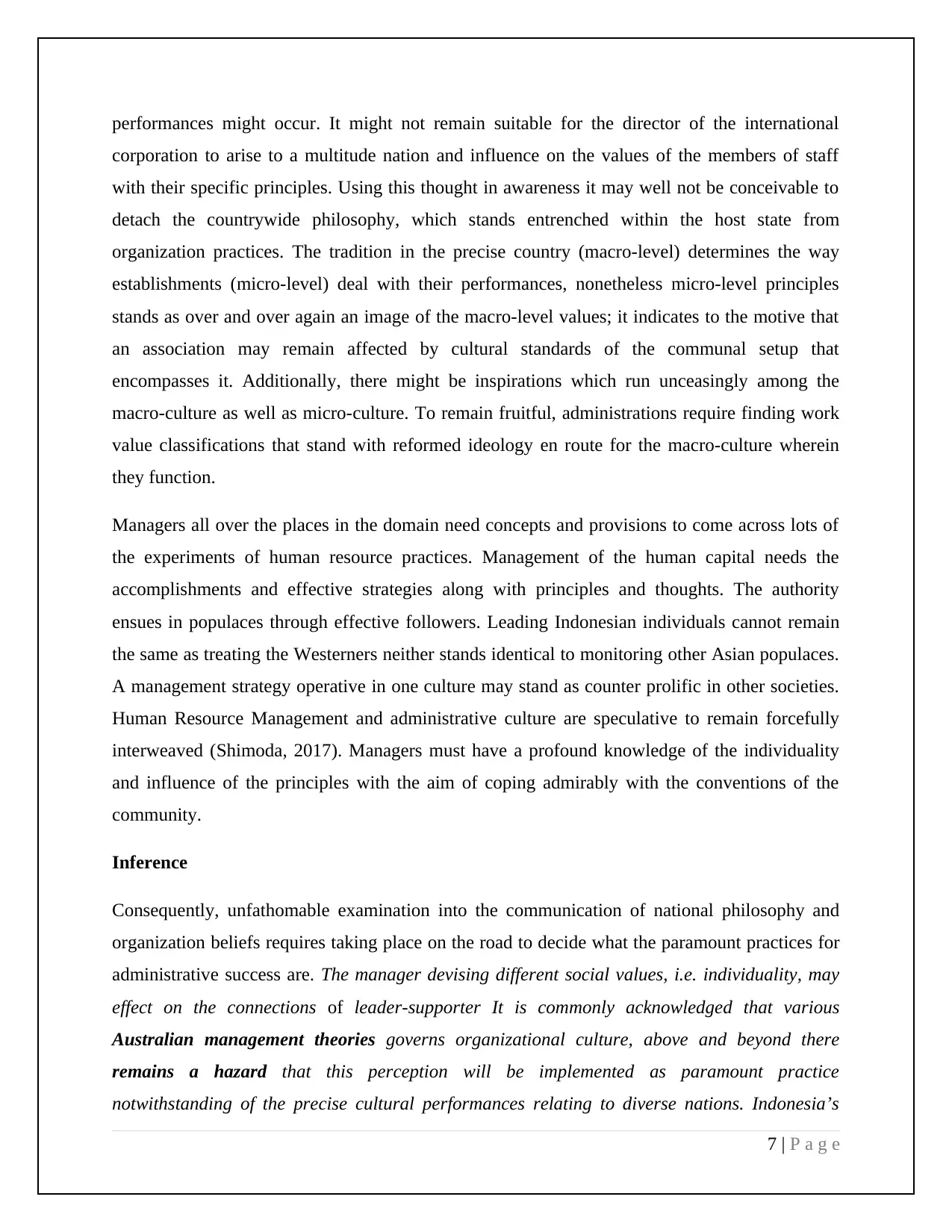
performances might occur. It might not remain suitable for the director of the international
corporation to arise to a multitude nation and influence on the values of the members of staff
with their specific principles. Using this thought in awareness it may well not be conceivable to
detach the countrywide philosophy, which stands entrenched within the host state from
organization practices. The tradition in the precise country (macro-level) determines the way
establishments (micro-level) deal with their performances, nonetheless micro-level principles
stands as over and over again an image of the macro-level values; it indicates to the motive that
an association may remain affected by cultural standards of the communal setup that
encompasses it. Additionally, there might be inspirations which run unceasingly among the
macro-culture as well as micro-culture. To remain fruitful, administrations require finding work
value classifications that stand with reformed ideology en route for the macro-culture wherein
they function.
Managers all over the places in the domain need concepts and provisions to come across lots of
the experiments of human resource practices. Management of the human capital needs the
accomplishments and effective strategies along with principles and thoughts. The authority
ensues in populaces through effective followers. Leading Indonesian individuals cannot remain
the same as treating the Westerners neither stands identical to monitoring other Asian populaces.
A management strategy operative in one culture may stand as counter prolific in other societies.
Human Resource Management and administrative culture are speculative to remain forcefully
interweaved (Shimoda, 2017). Managers must have a profound knowledge of the individuality
and influence of the principles with the aim of coping admirably with the conventions of the
community.
Inference
Consequently, unfathomable examination into the communication of national philosophy and
organization beliefs requires taking place on the road to decide what the paramount practices for
administrative success are. The manager devising different social values, i.e. individuality, may
effect on the connections of leader-supporter It is commonly acknowledged that various
Australian management theories governs organizational culture, above and beyond there
remains a hazard that this perception will be implemented as paramount practice
notwithstanding of the precise cultural performances relating to diverse nations. Indonesia’s
7 | P a g e
corporation to arise to a multitude nation and influence on the values of the members of staff
with their specific principles. Using this thought in awareness it may well not be conceivable to
detach the countrywide philosophy, which stands entrenched within the host state from
organization practices. The tradition in the precise country (macro-level) determines the way
establishments (micro-level) deal with their performances, nonetheless micro-level principles
stands as over and over again an image of the macro-level values; it indicates to the motive that
an association may remain affected by cultural standards of the communal setup that
encompasses it. Additionally, there might be inspirations which run unceasingly among the
macro-culture as well as micro-culture. To remain fruitful, administrations require finding work
value classifications that stand with reformed ideology en route for the macro-culture wherein
they function.
Managers all over the places in the domain need concepts and provisions to come across lots of
the experiments of human resource practices. Management of the human capital needs the
accomplishments and effective strategies along with principles and thoughts. The authority
ensues in populaces through effective followers. Leading Indonesian individuals cannot remain
the same as treating the Westerners neither stands identical to monitoring other Asian populaces.
A management strategy operative in one culture may stand as counter prolific in other societies.
Human Resource Management and administrative culture are speculative to remain forcefully
interweaved (Shimoda, 2017). Managers must have a profound knowledge of the individuality
and influence of the principles with the aim of coping admirably with the conventions of the
community.
Inference
Consequently, unfathomable examination into the communication of national philosophy and
organization beliefs requires taking place on the road to decide what the paramount practices for
administrative success are. The manager devising different social values, i.e. individuality, may
effect on the connections of leader-supporter It is commonly acknowledged that various
Australian management theories governs organizational culture, above and beyond there
remains a hazard that this perception will be implemented as paramount practice
notwithstanding of the precise cultural performances relating to diverse nations. Indonesia’s
7 | P a g e
Paraphrase This Document
Need a fresh take? Get an instant paraphrase of this document with our AI Paraphraser
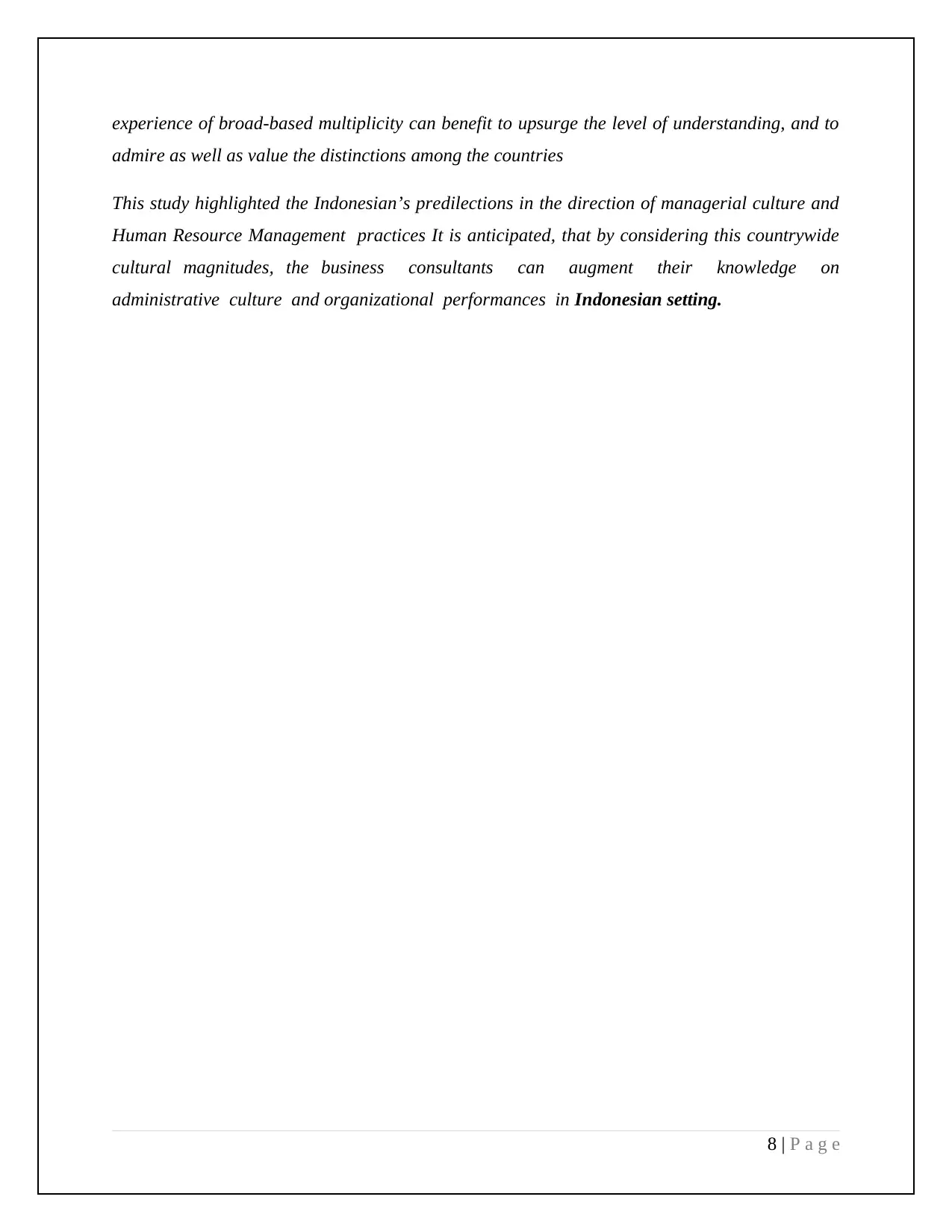
experience of broad-based multiplicity can benefit to upsurge the level of understanding, and to
admire as well as value the distinctions among the countries
This study highlighted the Indonesian’s predilections in the direction of managerial culture and
Human Resource Management practices It is anticipated, that by considering this countrywide
cultural magnitudes, the business consultants can augment their knowledge on
administrative culture and organizational performances in Indonesian setting.
8 | P a g e
admire as well as value the distinctions among the countries
This study highlighted the Indonesian’s predilections in the direction of managerial culture and
Human Resource Management practices It is anticipated, that by considering this countrywide
cultural magnitudes, the business consultants can augment their knowledge on
administrative culture and organizational performances in Indonesian setting.
8 | P a g e
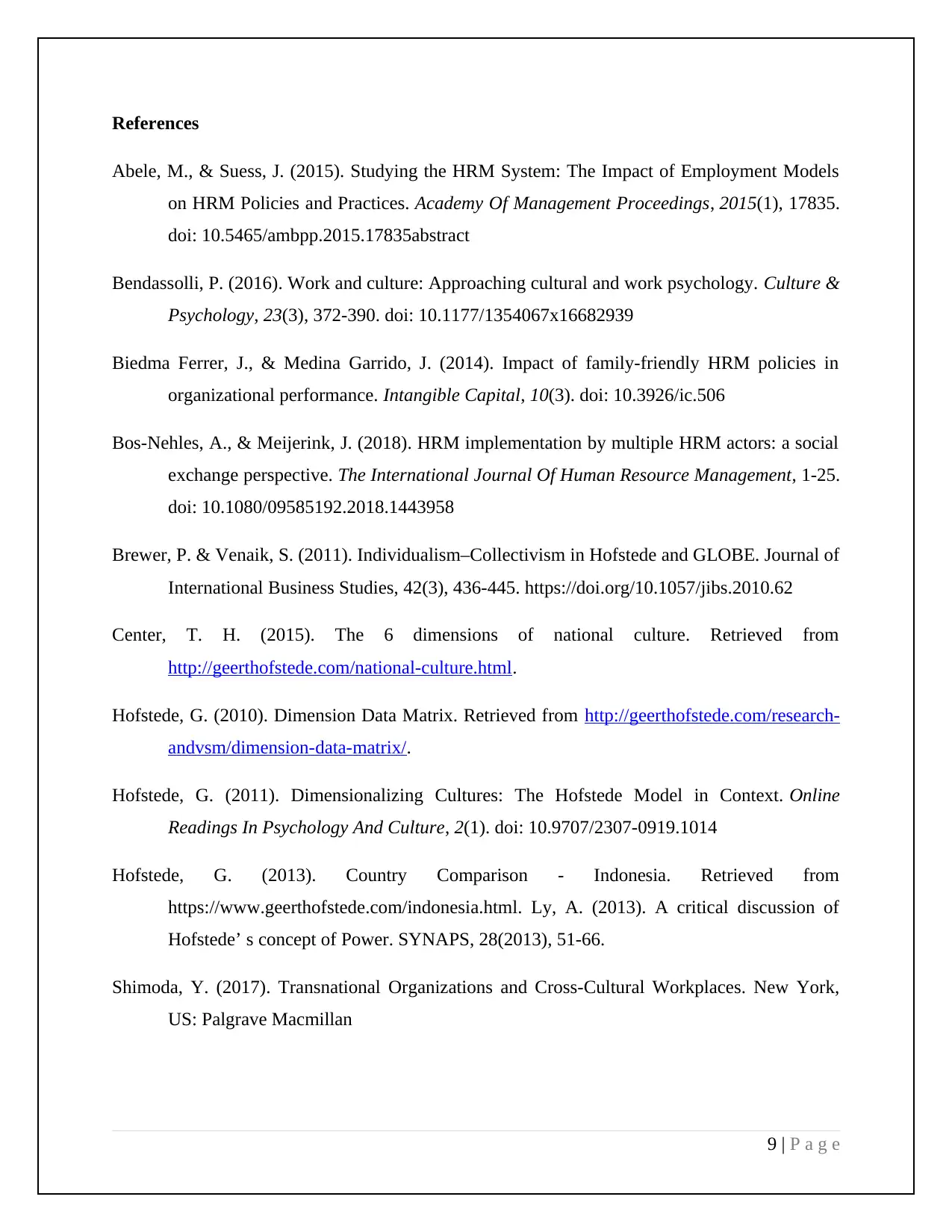
References
Abele, M., & Suess, J. (2015). Studying the HRM System: The Impact of Employment Models
on HRM Policies and Practices. Academy Of Management Proceedings, 2015(1), 17835.
doi: 10.5465/ambpp.2015.17835abstract
Bendassolli, P. (2016). Work and culture: Approaching cultural and work psychology. Culture &
Psychology, 23(3), 372-390. doi: 10.1177/1354067x16682939
Biedma Ferrer, J., & Medina Garrido, J. (2014). Impact of family-friendly HRM policies in
organizational performance. Intangible Capital, 10(3). doi: 10.3926/ic.506
Bos-Nehles, A., & Meijerink, J. (2018). HRM implementation by multiple HRM actors: a social
exchange perspective. The International Journal Of Human Resource Management, 1-25.
doi: 10.1080/09585192.2018.1443958
Brewer, P. & Venaik, S. (2011). Individualism–Collectivism in Hofstede and GLOBE. Journal of
International Business Studies, 42(3), 436-445. https://doi.org/10.1057/jibs.2010.62
Center, T. H. (2015). The 6 dimensions of national culture. Retrieved from
http://geerthofstede.com/national-culture.html.
Hofstede, G. (2010). Dimension Data Matrix. Retrieved from http://geerthofstede.com/research-
andvsm/dimension-data-matrix/.
Hofstede, G. (2011). Dimensionalizing Cultures: The Hofstede Model in Context. Online
Readings In Psychology And Culture, 2(1). doi: 10.9707/2307-0919.1014
Hofstede, G. (2013). Country Comparison - Indonesia. Retrieved from
https://www.geerthofstede.com/indonesia.html. Ly, A. (2013). A critical discussion of
Hofstede’ s concept of Power. SYNAPS, 28(2013), 51-66.
Shimoda, Y. (2017). Transnational Organizations and Cross-Cultural Workplaces. New York,
US: Palgrave Macmillan
9 | P a g e
Abele, M., & Suess, J. (2015). Studying the HRM System: The Impact of Employment Models
on HRM Policies and Practices. Academy Of Management Proceedings, 2015(1), 17835.
doi: 10.5465/ambpp.2015.17835abstract
Bendassolli, P. (2016). Work and culture: Approaching cultural and work psychology. Culture &
Psychology, 23(3), 372-390. doi: 10.1177/1354067x16682939
Biedma Ferrer, J., & Medina Garrido, J. (2014). Impact of family-friendly HRM policies in
organizational performance. Intangible Capital, 10(3). doi: 10.3926/ic.506
Bos-Nehles, A., & Meijerink, J. (2018). HRM implementation by multiple HRM actors: a social
exchange perspective. The International Journal Of Human Resource Management, 1-25.
doi: 10.1080/09585192.2018.1443958
Brewer, P. & Venaik, S. (2011). Individualism–Collectivism in Hofstede and GLOBE. Journal of
International Business Studies, 42(3), 436-445. https://doi.org/10.1057/jibs.2010.62
Center, T. H. (2015). The 6 dimensions of national culture. Retrieved from
http://geerthofstede.com/national-culture.html.
Hofstede, G. (2010). Dimension Data Matrix. Retrieved from http://geerthofstede.com/research-
andvsm/dimension-data-matrix/.
Hofstede, G. (2011). Dimensionalizing Cultures: The Hofstede Model in Context. Online
Readings In Psychology And Culture, 2(1). doi: 10.9707/2307-0919.1014
Hofstede, G. (2013). Country Comparison - Indonesia. Retrieved from
https://www.geerthofstede.com/indonesia.html. Ly, A. (2013). A critical discussion of
Hofstede’ s concept of Power. SYNAPS, 28(2013), 51-66.
Shimoda, Y. (2017). Transnational Organizations and Cross-Cultural Workplaces. New York,
US: Palgrave Macmillan
9 | P a g e
⊘ This is a preview!⊘
Do you want full access?
Subscribe today to unlock all pages.

Trusted by 1+ million students worldwide
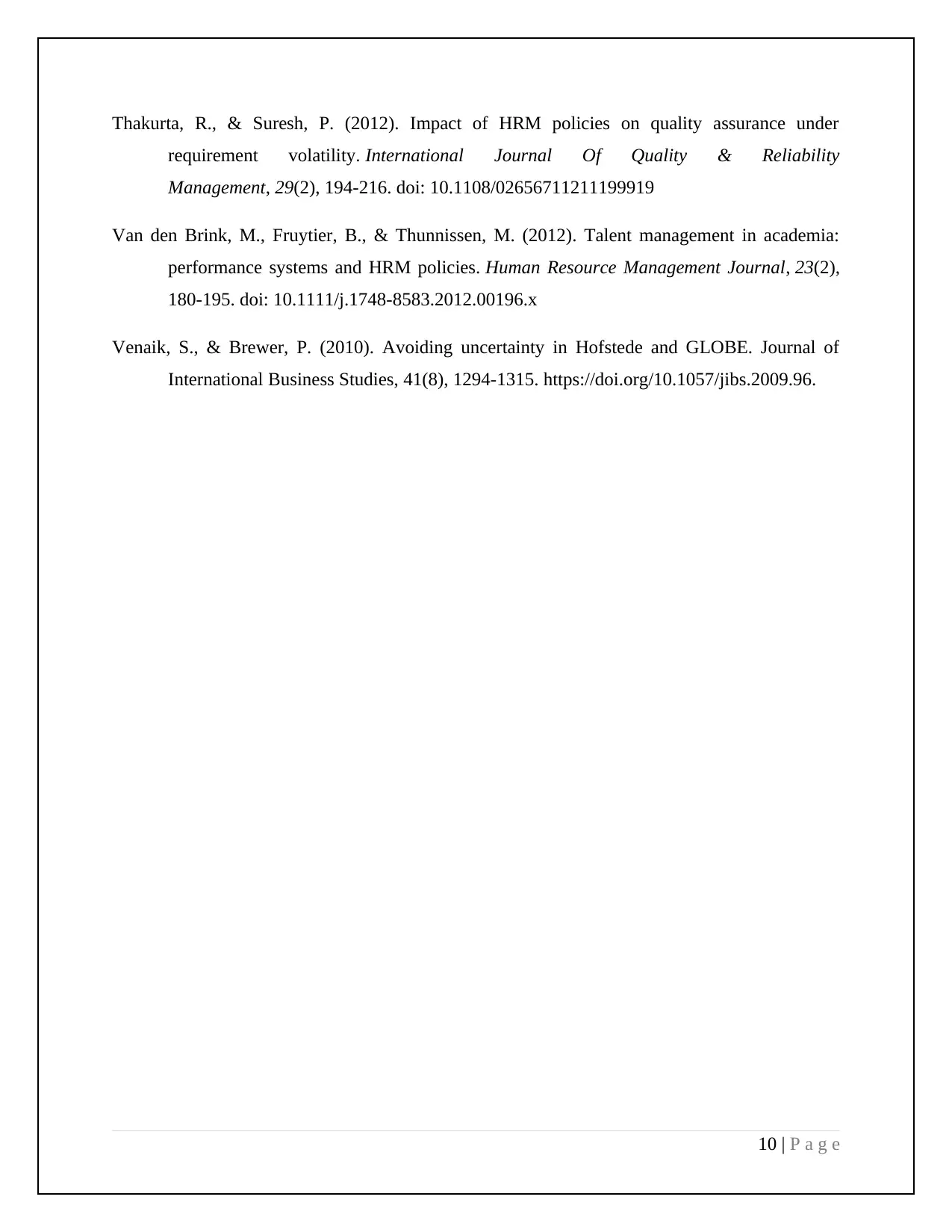
Thakurta, R., & Suresh, P. (2012). Impact of HRM policies on quality assurance under
requirement volatility. International Journal Of Quality & Reliability
Management, 29(2), 194-216. doi: 10.1108/02656711211199919
Van den Brink, M., Fruytier, B., & Thunnissen, M. (2012). Talent management in academia:
performance systems and HRM policies. Human Resource Management Journal, 23(2),
180-195. doi: 10.1111/j.1748-8583.2012.00196.x
Venaik, S., & Brewer, P. (2010). Avoiding uncertainty in Hofstede and GLOBE. Journal of
International Business Studies, 41(8), 1294-1315. https://doi.org/10.1057/jibs.2009.96.
10 | P a g e
requirement volatility. International Journal Of Quality & Reliability
Management, 29(2), 194-216. doi: 10.1108/02656711211199919
Van den Brink, M., Fruytier, B., & Thunnissen, M. (2012). Talent management in academia:
performance systems and HRM policies. Human Resource Management Journal, 23(2),
180-195. doi: 10.1111/j.1748-8583.2012.00196.x
Venaik, S., & Brewer, P. (2010). Avoiding uncertainty in Hofstede and GLOBE. Journal of
International Business Studies, 41(8), 1294-1315. https://doi.org/10.1057/jibs.2009.96.
10 | P a g e
1 out of 10
Your All-in-One AI-Powered Toolkit for Academic Success.
+13062052269
info@desklib.com
Available 24*7 on WhatsApp / Email
![[object Object]](/_next/static/media/star-bottom.7253800d.svg)
Unlock your academic potential
Copyright © 2020–2025 A2Z Services. All Rights Reserved. Developed and managed by ZUCOL.